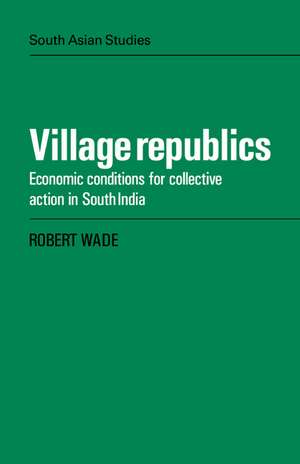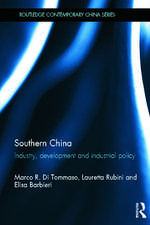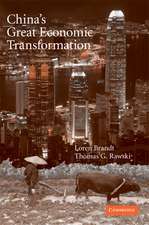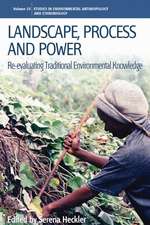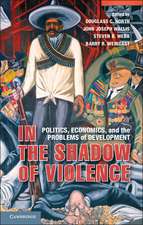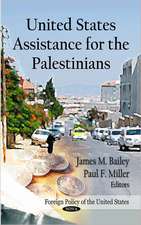Village Republics: Economic Conditions for Collective Action in South India: Cambridge South Asian Studies, cartea 40
Autor Robert Wadeen Limba Engleză Paperback – 2 dec 2007
Din seria Cambridge South Asian Studies
-
 Preț: 238.21 lei
Preț: 238.21 lei -
 Preț: 329.54 lei
Preț: 329.54 lei -
 Preț: 361.92 lei
Preț: 361.92 lei -
 Preț: 334.29 lei
Preț: 334.29 lei -
 Preț: 291.69 lei
Preț: 291.69 lei -
 Preț: 411.37 lei
Preț: 411.37 lei -
 Preț: 287.19 lei
Preț: 287.19 lei -
 Preț: 321.31 lei
Preț: 321.31 lei -
 Preț: 276.77 lei
Preț: 276.77 lei -
 Preț: 320.75 lei
Preț: 320.75 lei -
 Preț: 319.99 lei
Preț: 319.99 lei -
 Preț: 322.12 lei
Preț: 322.12 lei -
 Preț: 279.17 lei
Preț: 279.17 lei -
 Preț: 278.24 lei
Preț: 278.24 lei -
 Preț: 285.54 lei
Preț: 285.54 lei -
 Preț: 284.78 lei
Preț: 284.78 lei -
 Preț: 285.93 lei
Preț: 285.93 lei -
 Preț: 328.56 lei
Preț: 328.56 lei -
 Preț: 290.67 lei
Preț: 290.67 lei -
 Preț: 283.63 lei
Preț: 283.63 lei -
 Preț: 284.98 lei
Preț: 284.98 lei -
 Preț: 271.77 lei
Preț: 271.77 lei -
 Preț: 287.48 lei
Preț: 287.48 lei -
 Preț: 361.96 lei
Preț: 361.96 lei -
 Preț: 357.76 lei
Preț: 357.76 lei -
 Preț: 287.28 lei
Preț: 287.28 lei -
 Preț: 293.66 lei
Preț: 293.66 lei -
 Preț: 285.93 lei
Preț: 285.93 lei -
 Preț: 285.93 lei
Preț: 285.93 lei -
 Preț: 279.17 lei
Preț: 279.17 lei -
 Preț: 399.50 lei
Preț: 399.50 lei -
 Preț: 287.28 lei
Preț: 287.28 lei -
 Preț: 284.17 lei
Preț: 284.17 lei -
 Preț: 348.23 lei
Preț: 348.23 lei -
 Preț: 427.51 lei
Preț: 427.51 lei -
 Preț: 273.72 lei
Preț: 273.72 lei -
 Preț: 332.91 lei
Preț: 332.91 lei -
 Preț: 284.56 lei
Preț: 284.56 lei -
 Preț: 281.30 lei
Preț: 281.30 lei -
 Preț: 327.32 lei
Preț: 327.32 lei -
 Preț: 338.80 lei
Preț: 338.80 lei -
 Preț: 325.20 lei
Preț: 325.20 lei -
 Preț: 281.22 lei
Preț: 281.22 lei -
 Preț: 241.24 lei
Preț: 241.24 lei -
 Preț: 366.95 lei
Preț: 366.95 lei
Preț: 282.48 lei
Nou
Puncte Express: 424
Preț estimativ în valută:
54.06€ • 56.23$ • 44.63£
54.06€ • 56.23$ • 44.63£
Carte tipărită la comandă
Livrare economică 15-29 aprilie
Preluare comenzi: 021 569.72.76
Specificații
ISBN-13: 9780521051781
ISBN-10: 0521051789
Pagini: 256
Dimensiuni: 140 x 216 x 15 mm
Greutate: 0.33 kg
Editura: Cambridge University Press
Colecția Cambridge University Press
Seria Cambridge South Asian Studies
Locul publicării:Cambridge, United Kingdom
ISBN-10: 0521051789
Pagini: 256
Dimensiuni: 140 x 216 x 15 mm
Greutate: 0.33 kg
Editura: Cambridge University Press
Colecția Cambridge University Press
Seria Cambridge South Asian Studies
Locul publicării:Cambridge, United Kingdom
Cuprins
List of illustrations; List of tables; Preface; 1. The village as a corporate group; 2. The circumstances of village organization; 3. Kottapalle; 4. The social response to open-field husbandry; 5. The social response to irrigation; 6. The range of council activities; 7. The mode of public choice; 8. Variation between villages (1): social structure; 9. Variation between villages (2): ecology and risk; 10. Conclusions (1): the conditions for collective action; 11. Conclusions (2): theories of collective action; Appendix: water supply and irrigation network; Bibliography; Index.
Descriere
Robert Wade examines the economic conditions for collective action drawing on research in areas of Andhra Pradesh.
